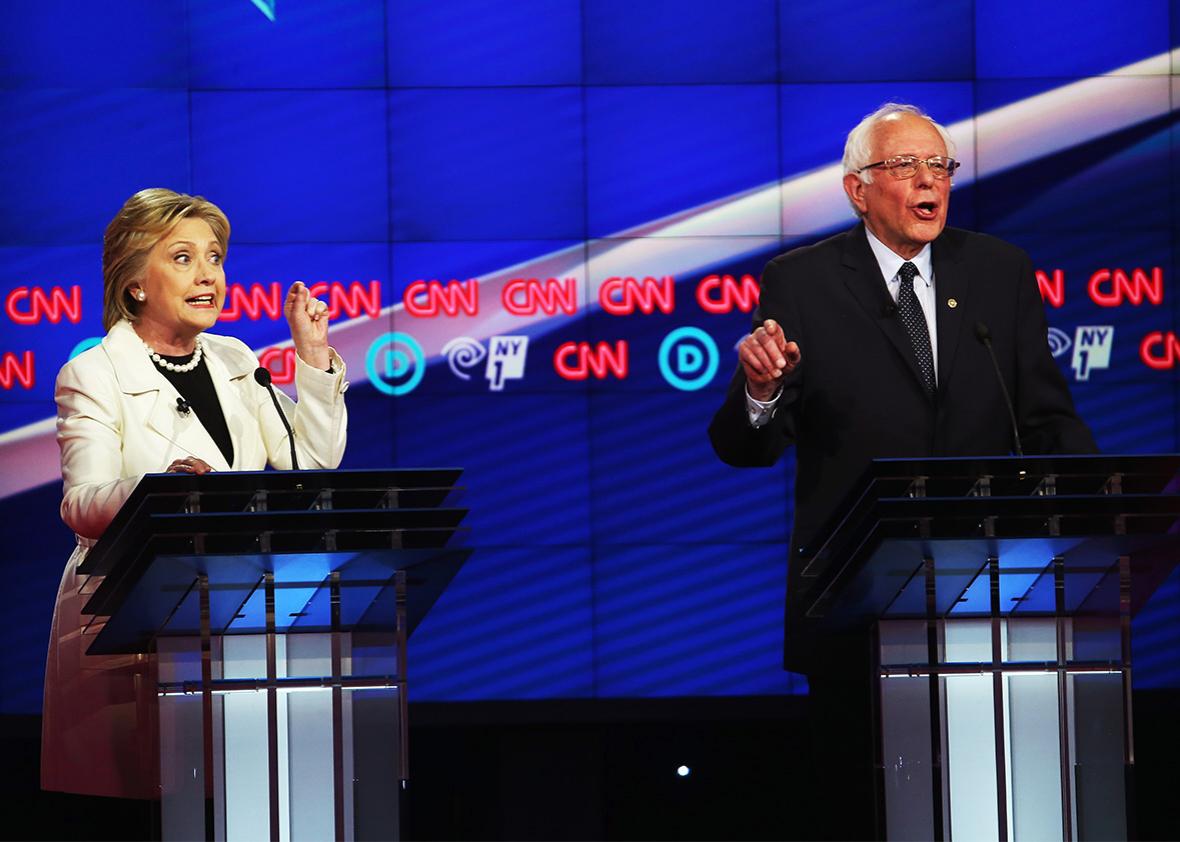On Thursday, the Bernie Sanders campaign suspended its new Jewish outreach coordinator, Simone Zimmerman, who was anathematized on the right for, among other things, calling Israeli Prime Minister Benjamin Netanyahu an “arrogant, deceptive, cynical, manipulative asshole” on Facebook. The move seemed like a capitulation by the idealistic Sanders camp to the sordid realities of presidential politics, especially in New York. As the New York Times reported, “a significant number of Jewish voters consider Ms. Zimmerman and her allies to be radicals, and the Sanders campaign, already facing a more than 30-point deficit among New York’s Jewish Democrats, according to a new NBC New York/Wall Street Journal/Marist poll, took action.”
That made it all the more surprising when, just a few hours later, Sanders made a brave, unprecedented defense of Palestinian humanity from a primary debate stage in Brooklyn.
It began with a question about Israel’s 2014 war in Gaza, which Sanders rightly called “disproportionate.” Moderator Wolf Blitzer, perhaps attempting to expose a weak spot, asked him, “What do you say to those who believe that Israel has a right to defend itself as it sees fit?” Sanders, however, stuck to his position. Then he said, “[I]f we are ever going to bring peace to that region which has seen so much hatred and so much war, we are going to have to treat the Palestinian people with respect and dignity.”
Clinton followed with a cringe-worthy defense of the war, evading the question of whether Israel could have acted with less overwhelming force. It was one of those moments that demonstrated the chasm between what is morally right and what is politically useful, because even if her pro-Israel rhetoric outraged Sanders supporters, it probably played well with New York Jews, especially those for whom Israel is a decisive issue. (A 2014 Gallup poll found that among Americans who followed news of the conflict “very closely,” 71 percent thought Israel’s invasion was justified.) Sanders thus had little to gain, electorally speaking, from pressing Clinton on her Israel stance. But he did it anyway.
“Was their response disproportionate?” he asked. “I believe that it was, you have not answered that.” Then he hit Clinton on her egregiously one-sided speech before the American Israel Public Affairs Committee in March: “I heard virtually no discussion at all about the needs of the Palestinian people. Almost none in that speech.” He criticized her fealty to Netanyahu: “There comes a time when if we pursue justice and peace, we are going to have to say that Netanyahu is not right all of the time.” And then he returned to the AIPAC speech. “[W]e cannot continue to be one-sided,” he said. “There are two sides to the issue.”
The idea that the Palestinians have legitimate grievances—that there are two sides to the Israeli-Palestinian conflict—should be a political truism, but it’s generally a taboo. High-level American politicians hardly ever speak of Palestinian suffering, except when they’re blaming it on the feckless Palestinian leadership. Even those who forcefully advocate for the creation of a Palestinian state usually do so by arguing that it is in Israel’s best interest. There has never, in American presidential politics, been a penalty for being too pro-Israel, at least until Sanders briefly forced Clinton onto the defensive Thursday night. She ended up pointing out that she has indeed criticized Netanyahu: “I have spoken about and written at some length the very candid conversations I’ve had with him and other Israeli leaders.” This happens to be true; see, for example, the 2010 Reuters article headlined, “Hillary Clinton Berates Netanyahu Over Settlements.” But the fact that she was groping to distance herself from Netanyahu in a presidential debate was remarkable.
My guess is that this will not help Sanders in New York’s primary on Tuesday, and it will quite possibly hurt him. If that’s the case, he’ll have made a sacrifice to pry open American political conversation on an issue where it has been sealed shut. Whether or not it was strategically wise, it was a mitzvah.
